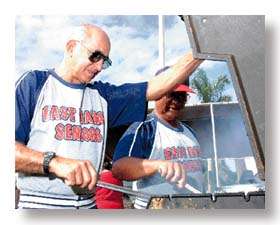“Wake-up call” to government to provide more funding With more elderly residents making up a greater portion of Kauai’s population, government agencies and organizations are likely to lobby the state and federal government for more funds to address the needs
“Wake-up call” to government to provide more funding
With more elderly residents making up a greater portion of Kauai’s population, government agencies and organizations are likely to lobby the state and federal government for more funds to address the needs of senior citizens, says the head of the Kaua’i County Office of Elderly Affairs.
Various 2000 census figures released this week showed the oldest segment of the island’s population has grown at a far faster rate than other age groups in the past decade.
The news should serve as a “wake-up call” to government to provide more funding for programs for seniors, says Kaua’i County Executive on Aging Ellie Lloyd.
“The numbers would seem to justify it,” she said.
But the $1.5 million in federal, state and county funding that comes to the Kaua’i County Office of Elderly Affairs and more than eight contractors and partners to serve people between 60 and 80 years and older has remained status quo for the past 10 years due to budget constraints, she said.
More than 10,000 Kaua’i seniors could be served by the programs, and that number will only jump in the next five to 10 years, with people living longer, said Sandy Salmers, one of two case managers with the county’s Office of Elderly Affairs.
The current programs — transportation, meals, medical health and recreation — meet the demands by seniors, but barely, Lloyd said.
“We are scrambling to meet the need and we don’t have nearly enough funds for in-home services we would like to provide,” Lloyd said.
Marching in step with a federal mandate to serve the frail and homebound, the Kaua’i County Council appropriated $25,000 this fiscal year for in-home services, Lloyd said.
Salmers, who has a masters degree in social work, and Jan Robinson, an occupational therapist, and five information and referral aides visit island homes to identity the number of homebound seniors and link them with services.
Barbara Burtch, a nominee for this year’s Outstanding Older Americans award, said she takes county-sponsored hula and ukulele classes offered at the Waimea Neighborhood Center. But she says she rarely signs up for other services because she wants to remain independent.
“I don’t use them, but they are used by many others,” she said. “It is a really good service what the count offers.”
The various agencies and organizations and the services for seniors are:
l County Parks and Recreational Division, which offers activity programs.
l County Transportation Agency, which provides bus service.
l Wilcox Hospital, which operates adult day care centers.
l Hawai’i Healthcare Professional Inc., which offers attendant care, homemaker services and personal care.
l Kaua’i Economic Opportunity, which offers nutrition services.
l Retired and Senior Volunteer Program, which offers volunteer opportunities for persons 55 years and over. Volunteers also visit the frail.
l Seniors’ Law Program Inc., which offers legal counseling and makes referrals related to Medicaid, Medicare, land-lord tenant, creditor issues and family law.
– American Association of Retired Persons.
– County driver licensing for handicapped parking information.
– State Department of Public Health Nursing.
– State Department of Human Services.
– Eldercare Kaua’i.
– Kaua’i Alzheimer’s Connection.
– Kaua’i Hospice.
– Kaua’i Senior Centers Inc.
– Social Security Administration.
– Kupuna Care, which helps homebound seniors live independently.
The groups are among 90 agencies and organizations on Kaua’i that serve the elderly and the public, Lloyd said.
The array of services for elderly “is an indication of a caring community” and illustrates the cooperation that exists between organizations, businesses and government to work together to benefit seniors, Lloyd said.
Most of the services, offered through a small donation or fee, are for people who are 60 years and older.
In certain exceptions, services are available to those who are 55 years old, but only if the recipient of services is disabled or is being helped by a caregiver, Lloyd said.
The 2000 census figures released this week show Hawai’i has a higher percentage of senior citizens than the rest of the nation and one of the highest life expectancies in the nation.
The state’s average life expectancy — about 79 years for those born in 1990 — is the highest in the nation.
Year-round warm weather, clean air and access to insurance are reasons that have been offered explaining Hawaii’s healthy population.
The census study also shows Hawai’i has a higher percentage of baby boomers between 45 and 54 years of age than the rest of the country.
The number of residents who are 85 years and older surged 69 percent, compared with the national average increase of 39 percent. On Kaua’i, up to 1400 people are 85 years and older.
Of the 1.2 million Hawai’i residents, more than 200,000 are seniors.
Staff writer Lester Chang can be reached at 245-3681 (ext. 225) and maito:lchang@pulitzer.net


